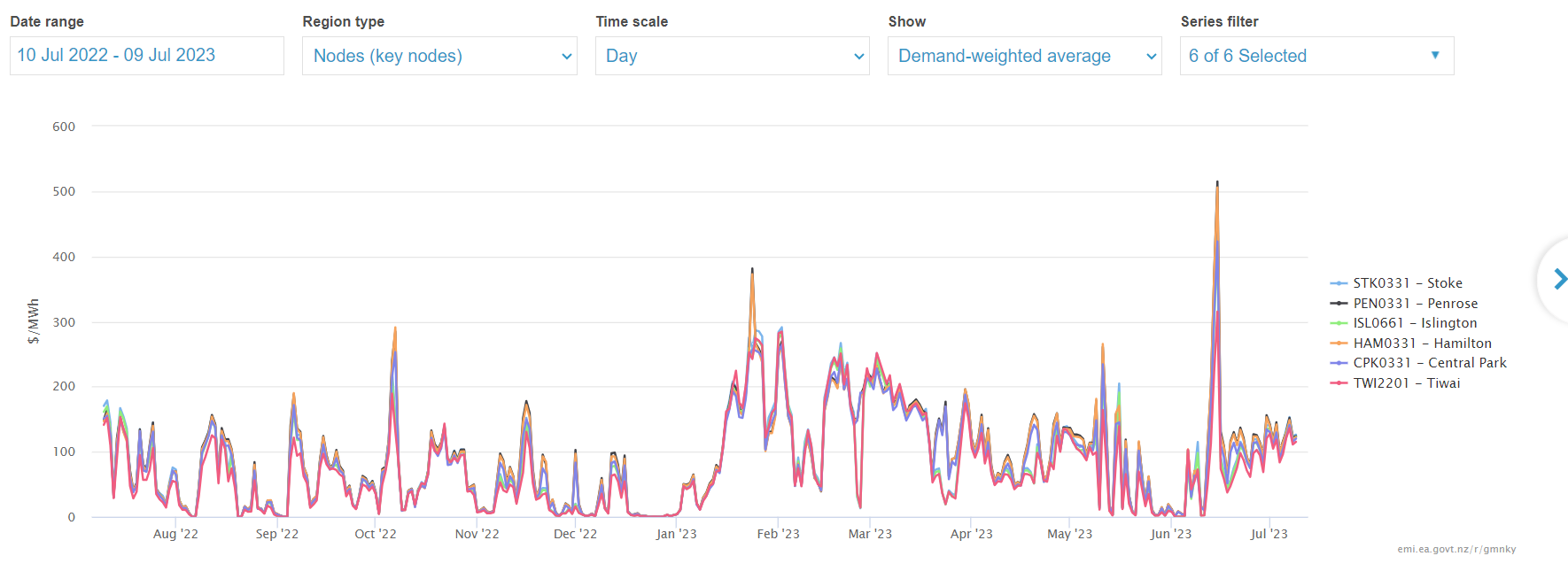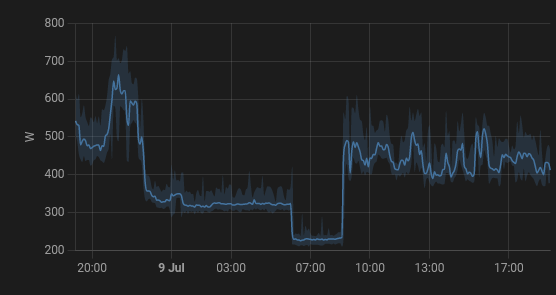Mine runs at 30watts at idle.
That powers 4 switches, 1AP, and my proxmox system (framework laptop motherboard) which runs my router and my services.
What is everyone else’s usage and what does it power?
Why are you asking, did my wife get you to ask?
But around 300w with 24 port switch, dish shelf (3.5" disks) and server with ssd’s and 2.5" disks
I feel for those in Europe, these are the current spot prices in NZ
Edit corrected image:
I approve of the y-axis label. But everything else is kinda missing… Like the information what’s depicted on the diagram. Cost of production? Price for a end-user? pre- or after tax? which country? and why did someone paint in 5 different colors? It certainly doesn’t match what i’m paying.
I try not too think about it 😬
I would guess everything together is around 800 Watts
My proxmox server runs at 60W idle, which is the main Reason why I am getting a new system soon. Old one is running a old (2011 I think) dual core celeron.
deleted by creator
Hmm according to homeassistant my Rack+PC consumed precisely this much over the last day (graph from homeassistant). I have been trying to minimize power consumption through more efficient hardware, but you can only go so far without making big sacrifices.

wow. unless you’re doing lots of compute / AI stuff /crypto or have multiple servers or a big amount of spinning storage, i bet your 450W is far from ‘efficient’ without ‘sacrifices’. You can have one decent cpu with a few cores, one or two spinning hdd and one or two ethernet NICs idling at 20W to 40W. probably also including a few VMs with light usage.
A single Xeon in an R630 with 256GB RAM and redundant PSUs idles around 100W, and that is with no storage controller or other add-in cards, no SSDs or HDDs. Stick some storage, add-in cards and actual load and you could easily see 300W+
Add in a UPS with some conversion losses and some switches, maybe a couple PoE injectors… 600W isn’t so far away
Yes we are looking at 2-3 generation old servers, but what do you expect for a home lab? It would be silly to pay a premium for newer equipment solely in the name of efficiency as the costs will far outweigh the energy savings. If you just care about being “green” then your money could do more spent elsewhere.
Sure one can run off old domestic hardware like old laptops/PCs or SBCs like a NUC/RPi but some of us are either trying to replicate a production environment or want/need ECC memory (or both).
Please don’t belittle other people’s setup just because you might not understand their motivations/constraints or think you might be able to do it “better”.
Edit: Not to mention the parent comment said this includes his PC. My PC is a bastion of inefficiency when playing games; have you seen the TDP on current gen CPUs and GPUs?
Dude, chill. This isn’t how that works. While a server that consumes as much as a few mordern lightbulbs will almost always be something like energy efficient if it does any kind of real work… This simply isn’t the case when we’re talking about half a kilowatt. And you don’t say my pc has X components and consumes Y amount of power, therefore it’s efficient. You measure that against the job it’s doing.
It’s like with a big truck and fuel efficency. It would be very inefficient to buy a big truck only to drive your daughter to school. But the same big truck might be very efficient at hauling large quantities of stuff through the country. The same applies to your setup. Good for you, for owning a CPU, memory and so on. I too have a few generations old Xeon, ECC ram and hard disks. This doesn’t tell me anything about efficiency without knowing what you DO with all of that energy. Hence my (implied) question…
But you’re right. I wasn’t paying close attention to the diagram. It is 220W - 320W for their rack/stuff and 450W when they also start up their pc.
This is self-hosting, it is inherently inefficient.
Consolidating servers, storage, power, cooling, networking is always more efficient.
From your example: one full bus is more efficient than any configuration of even the most efficient cars.
I do this for a bunch of reasons, including being a hobby. Hobbies aren’t meant to be efficient; first and foremost they are meant to be fun 😊
Dude, chill. This isn’t how that works.
I’m pretty chill. I’m not sure attacking someone’s efficiency based on their power consumption for an unspecified rack/workload is very chill…
Mine has been idling around 300-400 watts. I’ve recently been making some changes that have it running more than usual. I’m hoping in the next week I will get it back below 300 watt idle. With the space I have and the current cost of solar panels I basically offset the entire labs electric usage with about $800 worth of solar gear. So I haven’t stressed too much about electric use.
What did you get to offset the cost? I’d like to do something but idk where to start looking.
I went with simple micro-inverters (https://www.amazon.com/dp/B09N8T2741/) paired with some standard panels (https://www.amazon.com/dp/B0BRKK73QN/) Micro-inverters can’t be used when doing a full off-grid system but they are great at reducing energy bills. Super easy install that required no change to my home’s electric circuits.
I’m a simple man with a pi4 for my docker containers, one switch, so not much compared to my PC.
Would probably get a second pi4 if I need more resources.
Im also running a pi4 with docker containers but also my nextcloud instance. Been feeling it’s a bit sluggish at times so I recently ordered a cheap optiplex micro, and some upgrades for the ram, ssd and cpu. The pi4 will only be used for pi-hole now.
What’s the recommended way to measure power consumption? Any instrument in particular?
@humanreader @hungover_pilot @selfhosted Most folks I know use a KILL A WATT.
Hi there! Looks like you linked to a Lemmy community using an URL instead of its name, which doesn’t work well for people on different instances. Try fixing it like this: !selfhosted@lemmy.world
Around 100w usually for:
- ccr2004
- crs309
- old epyc 7601 server (about 60w, 8 HDDs with spindown, 5 ssds and a mcx311 10G)
- homeassistant raspi separate from the main server
- poe switch for phone and ap.
All connected to a UPS so measuring is easy and power usage is constant. I would prefer lower as power cost is very high but there is not really anything significant to save at the moment as the server board has no standby function and i need it most of the time.
Currently my UPS is reporting 207 watts, that’s with a unraid server (3600 + 32GB ram + 2060 super for plex, and 6 drives), a mini pc for pf sense, a rpi 4 running pihole and vpn server, a single poe ap, a modem, and security cameras… it can spike to 250w with multiple encodes going on from family … but overall not bad… I did have a dedicated 20A switch installed for just my network closet as well
Between 3 switches, 4 servers, and my desktop also using one of my UPS units, I average about 850w, with peaks up to 1.1kw when my desktop is running. Luckily, electricity where I live is only 13cents/kwh.
I really don’t like how people most commonly try to justify the monetary cost of their power consumption.
In my opinion the way more important metrics should be how the energy you are consuming is generated and how much carbon emissions are caused by it.
Who cares that your 2000W@230V idle are “free”, if that means you are burning crude oil in your backyard to generate it…
Who cares
My wallet
I’m not saying that cost of power is entirely irrelevant.
I’m saying that “My setup consumes a lot of power, but that’s fine because it doesn’t cost me much” is kind of backwards. While monetary cost certainly is one of the arguments for energy efficiency, responsibly using resources and avoiding wasting energy are way more compelling ones imo. That especially applies if your energy isn’t produced via renewable means.
Even if power was entirely free of monetary cost, you shouldn’t waste it, don’t you agree?
Dual Xeon 2640v3, Quadro P2000, 6 mechanical HDDs, 5 SSDs, 8 port LSI HBA.

How did you get that graph
Looks like a graph from a power meter displayed in Home Assistant to me.
My rack currently consumes about 300W. This includes the following hardware:
- Dell PowerEdge R730 with 128GB RAM, 1x E5-2630 v3 (the second socket is unpopulated), 5x HDD and 4x SSD
- MikroTik CRS309-1G-8S+ (8 port 10Gbit/s switch)
- MikroTik CRS326-24G-2S+ (24 port 1Gbit/s switch)
- MikroTik RB5009UPr (Router)
- Whitebox NAS with Intel Pentium Gold G5400, 16GB RAM, Adaptec RAID controller in IT mode, 19x HDD and one SSD
That’s a power efficient setup, nice!
110w ish. A Dell server with SSDs 370G ram, 2 sockets.
370G RAM ?!










